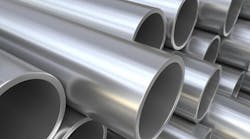The U.S. Commerce Department revealed its recommendations that the U.S. impose tariffs or quotas on imports of aluminum and steel, in the strongest indication yet the administration intends to see through its protectionist agenda.
Commerce “found that the quantities and circumstances of steel and aluminum imports threaten to impair the national security,” Secretary Wilbur Ross said on Feb. 16. The news spurred gains in metal prices as well shares in Alcoa Corp., Century Aluminum Co., and U.S. Steel Corp.
An increase in tariffs could impact consumer prices of everything from beer cans to cars.
The recommendations were sent last month to President Donald Trump, who just this week said he was considering tariffs and quotas to protect American industry from the dumping of metals. Beverage companies and carmakers have joined some lawmakers from Trump’s own Republican party in opposing tariffs, saying they would threaten U.S. manufacturing jobs.
Stocks of Ford Industries Inc. and General Motors Co. dropped after the news on Feb. 16.
The proposed restrictions come weeks after the administration imposed import duties on solar panels and washing machines. Unlike those cases, the recommendations on Feb. 16 were driven by an obscure section of the 1962 Trade Act that allows the president to impose tariffs without congressional approval if he determines the imports threaten U.S. security.
Tariffs, Quotas
In a briefing with reporters over the results of his department’s investigation, Ross proposed a 24% global tariff on steel shipments coming into the U.S. and a 7.7% duty on aluminum imports. Trump has the latitude to choose between these types of options or even enter talks with producers to find solutions. He has until about mid-April under the trade law to decide on any potential action.
The recommendations pushed up Century as much as 11%, while Alcoa gained 5.5%. Aluminum on the London Metal Exchange rose as much as 2.4%. Among steelmakers, Nucor Corp., the largest American producer, climbed 6%, the biggest intraday increase since November 2016. U.S. Steel advanced 13%, the most since November.
Imposing tariffs on such widely used commodities may trigger retaliatory measures from China, the world’s biggest producer of steel and aluminum. It could also inflate manufacturing and consumer prices in the U.S., and inflame tensions with allies such as Japan, India, Germany and Canada. Group of 20 economies have pushed back against the threat of steel tariffs, warning such a move could set off a trade war.
Ross also outlined the following alternatives for the president to consider:
At least a 53% tariff on steel imports from Brazil, China, Costa Rica, Egypt, India, Malaysia, Korea, Russia, South Africa, Thailand, Turkey, Vietnam, with a quota by product on steel imports from all other countries equal to 100% of their 2017 exports to the U.S.Quota on steel imports from all countries up to 63% of their 2017 exports to the U.S.
For aluminum, a 23.6% tariff on metal when it comes from China, Russia, Venezuela and Vietnam and Hong Kong An aluminum quota of 86.7% of 2017 exports
Trump is facing resistance to tariffs from lawmakers in his own party. At a meeting this week at the White House, at least seven Republican lawmakers argued against any action that might set off a tit-for-tat response from China or other countries.
The president said the U.S. steel and aluminum industries “are being decimated by dumping and from many countries.” The administration is now considering “all options, and part of the options would be tariffs,” he told lawmakers at the meeting.
Such measures would encourage steel and aluminum producers to come back to the U.S., he said. Some companies in the steel industry, as well as unions such as United Steelworkers, have been pushing the president to come down hard on imports.
Speculation about possible U.S. action has roiled the metals industry. Imports of steel increasing last year in anticipation that new tariffs would elevate costs.
By Joe Deaux and Andrew Mayeda



